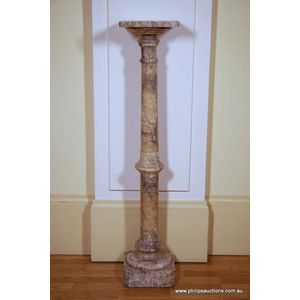Bamboo Dining Set with 4 Chairs
You must be a subscriber, and be logged in to view price and dealer details.
Subscribe Now to view actual auction price for this item
When you subscribe, you have the option of setting the currency in which to display prices to $Au, $US, $NZ or Stg.
- Faux Bamboo - Faux in French means "artificial" or "imitation", so faux bamboo is imitation bamboo. The wood was turned, notched and painted to look like bamboo. It was a popular design feature in the Regency period and can be seen on many "Chinese Chippendale" pieces.
Influenced by the growing trade with China, the style reached its peak with the Prince Regent's Royal Pavilion at Brighton, designed by John Nash, and built between 1817 and 1822. - Faux - A French word meaning "false", but when used in decorative arts, the intention is not to deceive, but to simulate the decorative effects of the more expensive material it is imitating. The term " faux bois" meaning "false wood" refers to a furniture item that has been decorated with a marked grain (woodgrain finish) to imitate a more expensive timber.
- Cane in Furniture Making - Cane, as used to make furniture is harvested from the ratan palm. The rattan palm is a type of climbing palm that is native to tropical regions of Asia and Africa. The stem of the rattan palm, also known as cane, is harvested, stripped of its skin, and then used to make a variety of furniture items. Rattan furniture is known for its durability, lightness and natural beauty. The cane is flexible yet strong and can be woven into various patterns, making it suitable for a wide range of furniture styles from traditional to modern. The furniture made from rattan cane is also known for its durability and resistance to extreme weather conditions. Popular items include chairs, tables, sofas, and cabinets. The natural colour of the cane can be preserved or it can be stained or painted for different looks.
This item has been included into following indexes:
- furniture, material or decoration - cane and wicker 93
- tables, large dining
Visually similar items

A swivel mounted ship's chair with cast iron base.

A huon pine demi-lune hall table, 19th century, (top replaced with ply), 72 cm high, 89 cm wide, 46 cm deep

A Carrara marble and brass circular patio table, French, circa 1900. 70 cm high, 21.5 cm diameter

An alabaster pedestal, in richly mottled and veined pale, amber and grey alabaster, with a square top to a graduated circular shallow cup, a knopped stem tapering to a shaped, waisted and spreading socle upon a squared base with canted corners. Height 114
